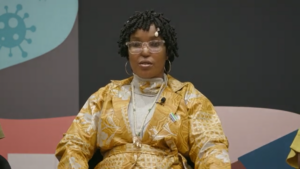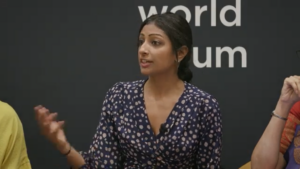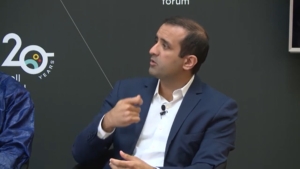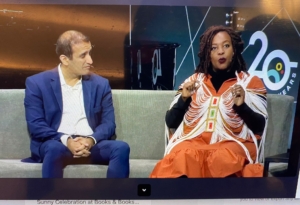This April, the Skoll World Forum returned both in-person and online, bringing together global changemakers and innovators to confront the world’s most complex challenges and offer bold, equitable, and evidence-driven solutions. “We’re all doing really hard work, and it means something to be surrounded by other people who are doing hard work,” says Last Mile Health’s Chief Program Officer James Nardella, reflecting on the value of the Skoll community.
At Skoll, Last Mile Health leaders and partners spoke in a number of key sessions, advocating for paid, professional community health workers as a key driver for universal health coverage as well as for their vital role in pandemic prevention and response.
Here are four powerful calls to action from the forum:
Community health workers are calling for greater recognition and pay—and it’s far past time to listen.
“Today I am here asking for us to be recognized,” said Sierra Leonean community health supervisor Ramatu Jalloh Yorpoi (Partners In Health and a community health worker advocate with CHIC), calling for equal pay and representation during a panel on designing pathways to equitable health outcomes. “As a woman, I believe if the opportunity is given to us, we will find out how powerful a woman is. We are the pillar of the nation’s health.”
To ensure equal access to healthcare, design community health systems with two areas in mind: gender and geography.
“Those who have the greatest need for health services are often least likely to receive it,” said Last Mile Health’s Deputy Chief Program Officer Mallika Raghavan, who also served as a panelist during the session on pathways to equitable health outcomes and spoke about the need to design programs that reach last mile communities and equitably employ women as community health workers. “When I think about the problem we are facing in equity and program design, there are two areas to focus on: geography and gender.”
As we reflect on three years of global pandemic response, we must not lose sight of the critical investment into strong community health systems for prevention of and response to disease outbreaks.
“We have to bring care to people, not wait for people to come to care,” said Last Mile Health’s co-founder and President Emeritus Raj Panjabi at a panel on pandemic preparedness. He discussed key takeaways from Ebola and COVID-19 and how we can better prepare for future pandemics, emphasizing the importance of community and frontline health workers and the systems that support them: “The approach to community-based responses which involved educating one’s own neighbor to counter things like vaccine hesitancy is incredibly powerful.”
Transforming community health financing to support and sustain paid, professional community health worker programs on the national level can reshape global health.
“As ecosystem players, we are at the front line of defense and need to be the shade that protects them,” said Angela Gichaga, CEO of Financing Alliance for Health and Co-Executive Director of Africa Frontline First during the closing plenary, highlighting the initiative’s collaborative effort to build strong community health systems, create 200,000 paid jobs for mostly women by 2030, and bring healthcare to 100 million people. “Health is a development issue and it begins in the community. We need to strengthen community health,” she said. “That’s tactical, that’s practical, that’s a real innovation.”








